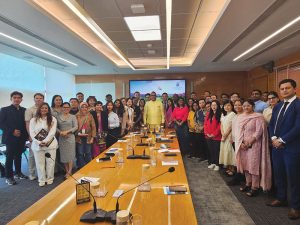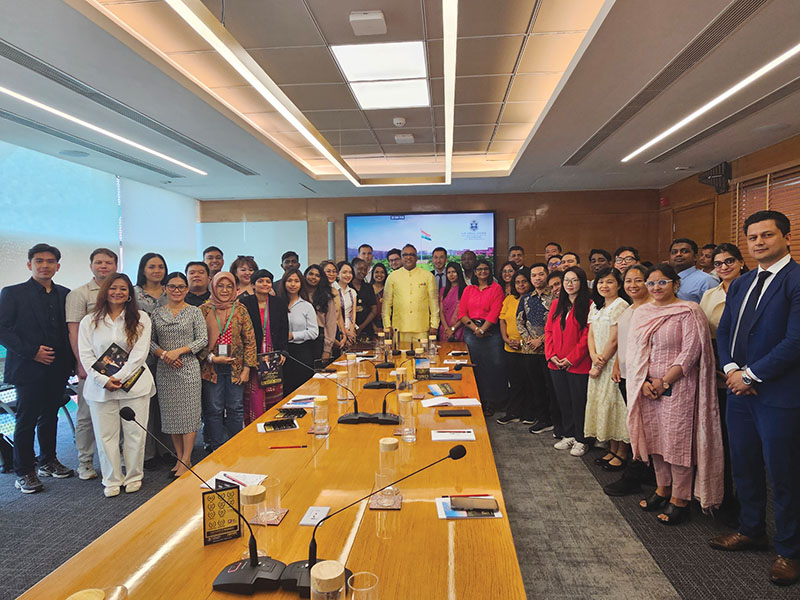21 Higher education leaders racing to develop india’s high-potential human resource: C. Raj Kumar
C. Raj Kumar
Vice Chancellor, O.P. Jindal Global University, Sonipat

A polymath alum of Madras, Delhi, Hong Kong, Oxford and Harvard universities, C. Raj Kumar is founding vice chancellor of the private top-ranked O.P. Jindal Global University, Sonipat (JGU, estb.2009).
What are the major objectives set for JGU until India’s 100th Freedom Anniversary in 2047?
Our objectives for the coming years are six-fold. First, to reinforce our pursuit of excellence in teaching, research and scholarship. Second, to multiply and deepen collaborations from around the world, creating a wide global academic network. Thirdly, to welcome diversity and uphold inclusivity. Fourth, to expand access to affordable and accessible higher education. Fifth, to promote institutional sustainability, not only in curriculum but also in institutional governance. And #6, to strengthen JGU’s presence in global institutional university ranking league tables.
How satisfied are you with your progress thus far?
When I look back at the past 16 years, JGU has surpassed expectations on many metrics. We were founded in 2009 with just one law school and a relatively small student body. Today, we are India’s top-ranked private university by EducationWorld — with 12 schools, six research institutes, and 60-plus interdisciplinary research centres.
We now have a student community of over 16,000 from more than 75 countries, 1,100 world-class faculty from 50 countries and over 3,000 administrative staff. JGU has signed academic collaboration agreements with 525 reputed higher education institutions in 80 countries. We are recognised as an ‘Institution of Eminence’ by the Union ministry of education, a coveted recognition given to only 12 public and private universities out of India’s 1,168 varsities.
What are your major initiatives to radically contemporise your syllabus/curriculum?
Our curriculum is a living, breathing entity, evolving with the times. It assimilates new knowledge, changing societal needs, and at all times, absorbs student feedback. Interdisciplinarity has been one of our most significant curricular initiatives, an integral value which has now been institutionalised at JGU. This means our students are now free to take courses across disciplines. Law students study public health and international affairs; business students explore human rights and environmental studies; liberal arts students engage with AI and data science.
How satisfied are you with JGU’s connect with Indian industry and business?
At JGU, we have fostered deep, sustained, and values-driven partnerships with industry which go beyond student placements and guest lectures. Over the past decade, we have focused on building strong advisory boards for all our 12 schools. These boards comprise distinguished business leaders, entrepreneurs, lawyers, investors, and technologists.
R&D and innovation are widely perceived as Indian academia’s infirmity. What’s your institutional response to create new knowledge?
One of our most important policy initiatives has been to recruit and retain globally oriented and research-active faculty. JGU currently has over 1,100 full-time faculty members from more than 50 countries, and 45 percent of them have educational qualifications from top 200 global universities. Consequently, we have a talent base with strong publication records, international training, and deep expertise across disciplines.
By 2047, we aspire to make JGU one of Asia’s leading research universities that not only generates and disseminates new knowledge but also applies it for social good.
What’s your prescription for transforming India into a $30 trillion GDP economy by 2047?
This is an ambitious yet achievable goal. But it demands a bold reimagination of our national priorities, especially in human capital development. The future of India will be based on how we harness the power of our 1 billion youth, who can lead India to transformative heights. In the new knowledge economy, economic growth cannot be sustained without widespread access to quality education, a thriving innovation ecosystem, and effective governance frameworks.
How optimistic are you about India’s future growth and development?
Very optimistic. However, optimism must be matched with action. The gaps in education, healthcare, urban infrastructure, and environmental protection are real and urgent. However, as we make laws and policies to address our national challenges, it is important to remember that development of all forms and manifestations are primarily about people. The vision for an Atmanirbhar and Viksit Bharat is directly correlated to the development of the people of India. With more than 70 percent of our people below age 35, we must channel our demographic dividend into human development, ensure quality education for all, create jobs of the future, and empower women and youth.
Also Read: EW Interview: Prof. Dr. C. Raj Kumar, VC, O.P. Jindal Global University

















Add comment